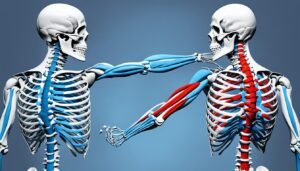If you feel both nausea and back pain, you’re not on your own. These symptoms are often linked and have many possible causes. Knowing what to look for and getting the right help can ease your suffering and solve the real issue.
Back pain is very common, affecting about 80% of people during their lives. The back helps support and steady our body, but that means it can easily get hurt. Nausea is the feeling you might throw up. It happens for many reasons, some related to stomach issues.
When nausea and back pain happen at the same time, it might be from gut problems causing pain in the back. Issues like biliary colic, pregnancy-related morning sickness, and appendicitis can lead to both nausea and back pain.
If your nausea and back pain last a while, or show signs like confusion or extreme weakness, it’s time to see a doctor. They’ll find the root of the problem and give you treatments that can help.
Key Takeaways
- Back pain and nausea often occur together due to pain related to digestive or intestinal issues radiating to the back.
- Common causes include biliary colic, pregnancy-related morning sickness, appendicitis, chronic pancreatitis, endometriosis, gallstones, kidney stones, and menstrual cramps.
- Seek medical attention if the symptoms persist for more than 24 hours or are accompanied by concerning signs like confusion, extreme weakness, or worsening symptoms.
- Addressing the underlying cause is crucial for effective treatment and relief of nausea and back pain.
- Home remedies and lifestyle changes can also help manage and prevent episodes of nausea and back pain.
Understanding Nausea and Back Pain
Feeling sick and having back pain is not fun. Let’s dive into what each means.
What is Back Pain?
Back pain varies in how bad and what it feels like. It’s often sharp or dull, showing something’s wrong with your back.
Bad posture, weak muscles, and injuries can all cause back pain.
What is Nausea?
Nausea makes you feel like throwing up. It happens for many reasons like stomach issues, infections, or being pregnant. Sometimes, you might actually throw up.
When nausea and back pain happen at the same time, it can be from stomach problems. Figuring out what’s wrong is key to feeling better.
Common Causes of Nausea and Back Pain
Nausea and back pain are often linked and caused by different things. Knowing the common causes helps find the right treatment and relief.
Digestive or Intestinal Issues
Digestive or intestinal problems can cause both nausea and back pain. Conditions like biliary colic, from gallstones blocking the gallbladder, cause severe pain and nausea. Appendicitis, chronic pancreatitis, and endometriosis also can lead to these symptoms.
Pregnancy-Related Causes
Being pregnant can also cause nausea and back pain, especially early on. Many pregnant women have morning sickness, making them feel sick and have back pain. The added weight of the growing baby can also hurt the back.
Other Potential Causes
Other reasons might include kidney stones, menstrual cramps, or infections. Conditions like kidney or urinary tract infections can also cause these issues. Seeking medical help is important for ongoing or worsening pain and nausea. Getting to the cause can bring relief and stop the problem from getting worse.
Symptoms of Nausea and Back Pain
Feeling sick and having back pain can be tough. They might feel different based on the reason. Nausea may come with throwing up, belly pain, dizziness, and tiredness. Back pain could be sharp or dull. It might include muscle aches, headache, and numb legs. The seriousness and how long they last can hint at the cause.
| Nausea Symptoms | Back Pain Symptoms |
|---|---|
|
|
Keep a close eye on how your nausea and back pain feel. This info is key for your doctor. It can point to what’s wrong and how to treat it.
nausea back pain
Identifying Nausea and Back Pain Symptoms
It’s key to know the signs of nausea and back pain. Doing this helps figure out what’s wrong. Feeling sick and throwing up might point to issues in your stomach or intestines, like biliary colic or appendicitis. If your back aches, it could be from different things. This includes getting hurt, being pregnant, or other health problems.
When to Seek Medical Attention
You should get help if the nausea and back pain won’t go away after 24 hours. Also, if the back pain isn’t from getting hurt. If you’re confused or extremely weak, or have specific kinds of pain, see a doctor at once. Plus, if you feel numb or weak in your legs, or have trouble peeing, these are serious signs. Pregnant women with nausea after three months should also see a doctor. It could be a sign of preeclampsia.
Diagnosing the Underlying Condition
Your doctor will try to find out why you feel sick and your back hurts. They start by checking you and asking about your health. Then, they choose which tests to do. These tests help find what’s causing your problems.
Medical Tests and Evaluations
Your doctor might order X-rays, CT scans, or MRIs. These let them see inside your body. They show if something is wrong with your bones, organs, or muscles. This info is a key step to know why you’re not feeling well.
They may also want you to get blood and urine tests. These can uncover infections or other issues. Finding such problems is important in figuring out what’s wrong with you.
The tests you’ll take depend on what your doctor thinks is causing your symptoms. They’ll choose the best plan to help you feel better.
Treatment Options for Nausea and Back Pain
When you have nausea and back pain, it’s critical to find the cause. Your doctor might suggest using medicines, natural home treatments, and taking care of yourself. These can help lessen the pain and support healing.
Medications for Relief
Your doctor could prescribe anti-nausea drugs like dolasetron (Anzemet) or granisetron (Granisol). These are safe to take, even if you’re pregnant. You can also use over-the-counter pills like ibuprofen or acetaminophen for back pain. They work well for pain from menstrual cramps or sore muscles.
Home Remedies and Self-Care
There are things you can do at home to ease nausea and back pain. Drinking lots of water and eating small, plain meals helps. So does resting and using ice or heat on your back.
Breathing deeply or meditating can also calm you down. This can make your pain feel less intense.
If the pain and nausea don’t go away, it’s time to see a doctor. They can help you figure out what’s going on and how to treat it. Working together, you and your doctor can find a solution to your discomfort.
Preventing Nausea and Back Pain
You can’t avoid being sick or getting a sore back all the time. But there are some things you can do to lower the chances. Eating well, drinking enough water, and not drinking too much alcohol can stop indigestion or tummy troubles. Also, it’s a good idea to keep your stress low and sit and stand the right way to lessen back ache.
Avoiding Triggers
It’s smart to know and stay away from what makes you feel sick or causes back pain. For some, it’s certain foods, hard works, or when times are extra tough, or stressful. By watching out for patterns in how you feel, you can change your daily life to avoid these bad moments.
Managing Chronic Nausea and Back Pain
Do you face chronic nausea and chronic back pain? If so, you might need long-term care to feel better. To tackle these nonstop issues, look into different things like medicine, exercises, and ways to handle stress.
Long-Term Treatment Strategies
To deal with chronic nausea and chronic back pain, constant care is key. This involves using pain meds, both normal and doctor-prescribed, to lower symptoms. It’s also important to do physical therapy. This can boost your core muscles, make you more flexible, and fix your posture. All of these can help reduce long-lasting back pain.
It’s also key to treat any other health problems that may be causing your chronic nausea and chronic back pain. Things like stomach issues, arthritis, or nerve troubles need a careful eye. Work closely with doctors who specialize in these areas. They can help you figure out and treat the root causes of your pain and sickness.
Coping Mechanisms
Managing chronic nausea and chronic back pain can be tough on your mind and feelings. Adding certain habits to your daily life can help. For instance, doing calming exercises like meditation, deep breaths, or yoga can cut down on stress. This in turn might lower how often you feel sick.
Getting support from those close to you or from a support group can make a big difference. It lets you talk about your feelings and learn from others. Also, doing things you enjoy, like hobbies, seeing friends, or light exercise, can lift your spirits. This can help you handle chronic nausea and chronic back pain better in the long run.
Conclusion
Nausea and back pain are tough symptoms to face. They can come from different causes. Think about what might be going on. This can help you know what to do. Ask a doctor for help. They can offer medicine, tips for home, and ways to change your life for the better. This will help you feel better and stop these problems from coming back.
Dealing with these issues on and off means you need to take care of yourself for a long time. This is very important for your health and happiness. Whether it’s stomach problems, being pregnant, or something else, you can make things better. Talk to your doctor. They can help you make a plan. This plan will be just for you, making you more comfortable and happy every day.
Learning about how to handle nausea and back pain is the first step to feeling better. With the right information, you can make things better. Remember, getting advice from a doctor is key. They can look at what’s going on and find a way to help you. This way, you can take charge of your health and get the care you need.




